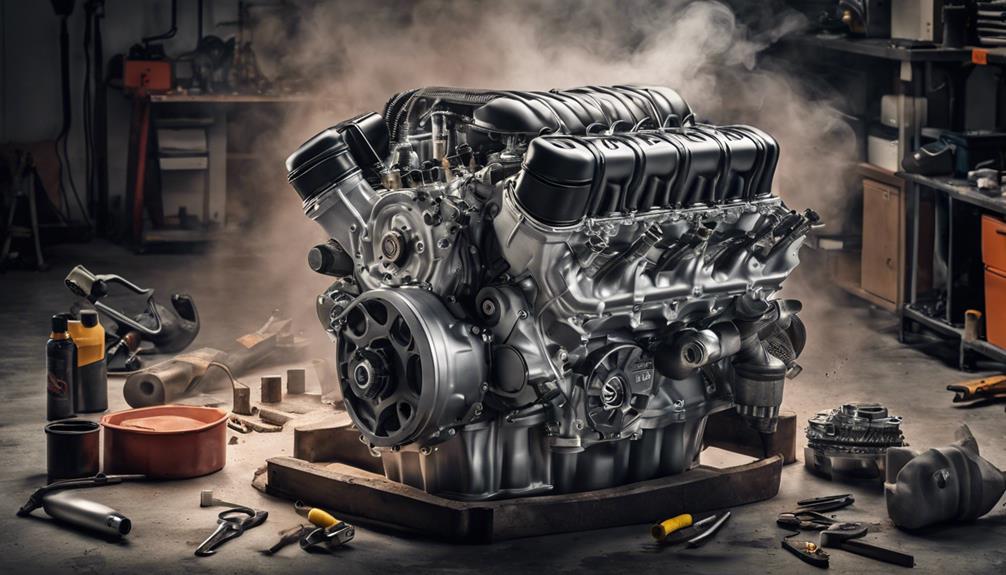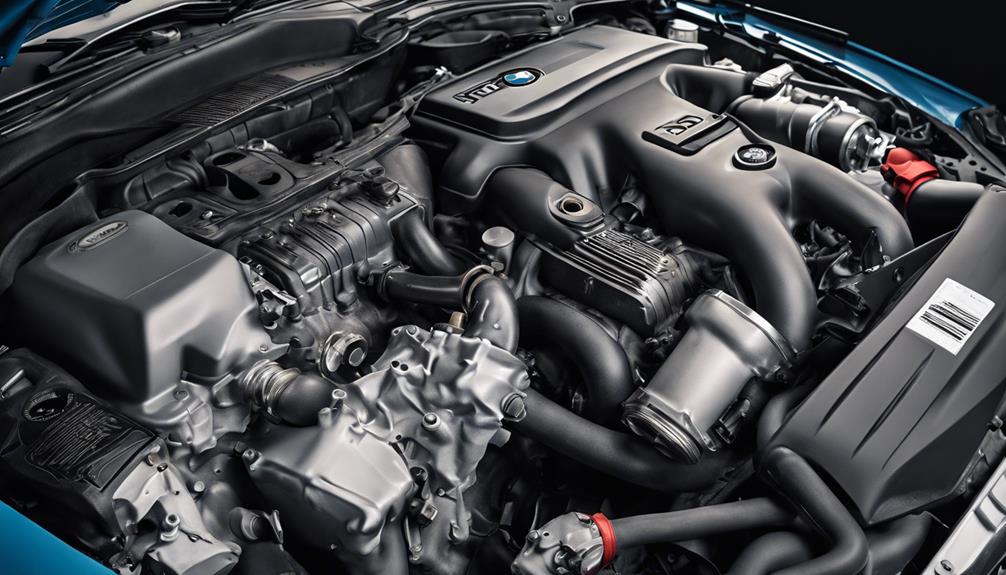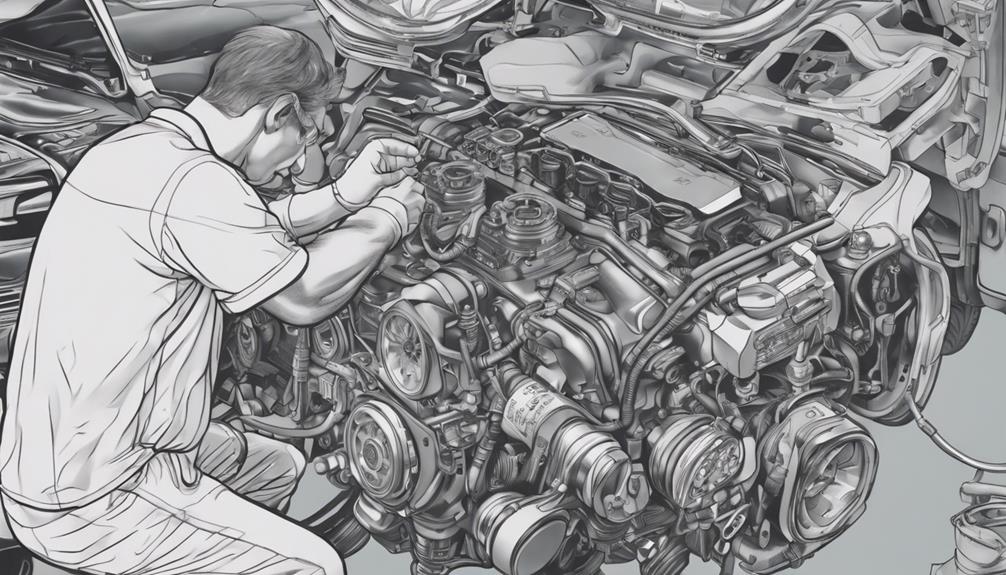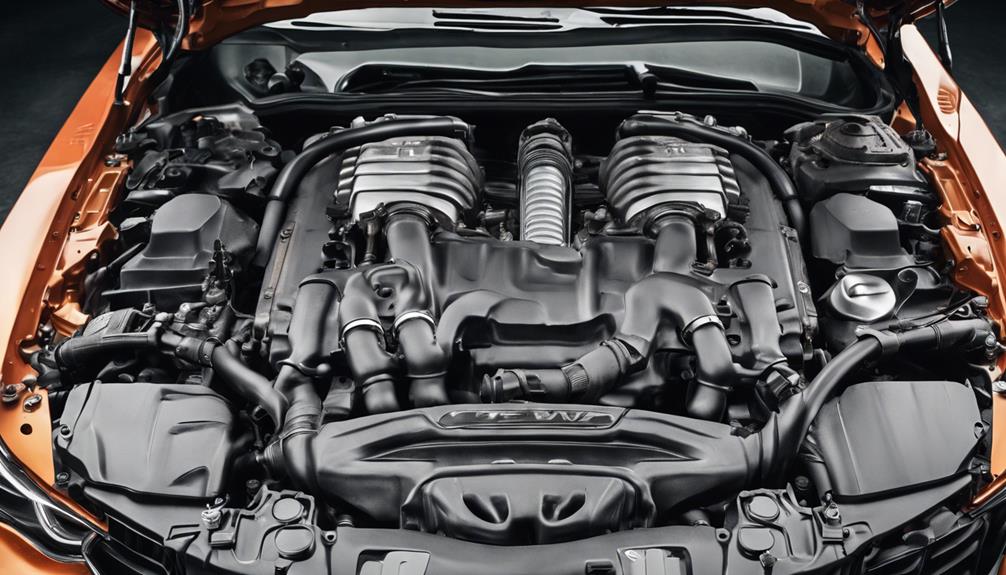Owning a BMW 350i means being ready to open your wallet wide for maintenance and repair – this posh ride can hit you with some hefty bills. From the need for premium gas to the high costs of fixing intricate electronic systems, your bank account might feel the heat. However, regular upkeep like oil changes and tire rotations can help keep your car purring. By the way, there are some more valuable tips ahead to keep your BMW running smoothly.
Key Takeaways
- Costly maintenance due to luxury status and complex systems.
- Premium gas requirement for optimal performance.
- Repair bills for electronic and engine issues can be expensive.
- Regular maintenance crucial to avoid hefty repair costs.
- Timely attention to maintenance needs can help manage expenses.
Costly Maintenance and Repair Expenses
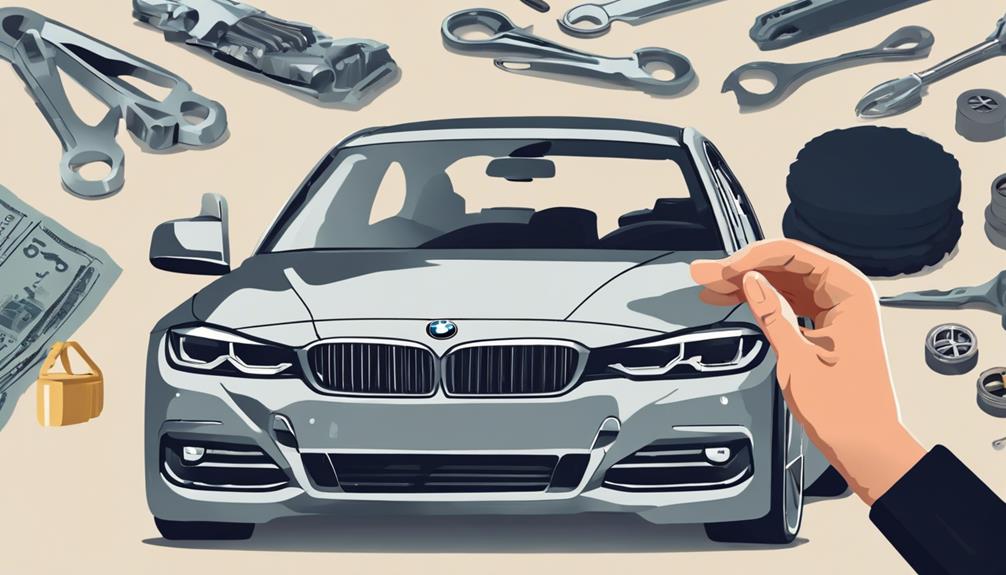
Maintenance and repairs for the BMW 325i can burn a hole in your pocket due to its luxurious status and intricate systems. While the BMW 325i is a reliable luxury import car, the high repair costs associated with its complex BMW systems are a point of concern for owners. The premium gas requirement further contributes to the overall maintenance expenses. Even though the BMW 325i may not need frequent servicing, when repairs are necessary, they come at a premium price.
Owning a BMW 325i means being prepared for the occasional hefty repair bill. Whether it's fixing electronic components or addressing issues with the engine, these repairs can quickly add up. If you're someone who values freedom, you might find the constant need to watch your wallet a bit restricting. However, with proper care and timely attention to maintenance needs, you can navigate these repair expenses with a bit more ease.
Regular Oil Changes and Tire Replacements
You know what's as essential as a good cup of coffee in the morning? Regular oil changes and tire replacements for your BMW 350i.
These maintenance tasks are like giving your car a spa day – they keep your engine purring and your tires ready to tackle any road.
Oil Change Frequency
To maintain ideal engine health and performance for your BMW 325i, regular oil changes every 5,000 to 7,500 miles are essential. Following the manufacturer's guidelines for oil change frequency is vital to prevent engine wear and guarantee peak performance.
Consistent oil changes help keep your BMW 325i running smoothly and efficiently. Remember, taking care of your engine with timely oil changes can save you from costly repairs down the road. Don't wait until there's a problem; stay proactive with your maintenance schedule and enjoy the benefits of a well-maintained vehicle.
- Timely oil changes are key to preventing engine wear.
- Following manufacturer's guidelines ensures peak performance.
- Regular maintenance can save you from costly repairs in the future.
Tire Wear Patterns
Regular oil changes on your BMW 325i not only guarantee optimal engine health but also play a crucial role in preventing abnormal tire wear patterns. To maintain even wear distribution and prolong tire lifespan, consider tire rotations every 5,000 to 7,000 miles. Monitor tire pressure monthly to detect any issues early. Keep in mind, irregular tire wear may indicate alignment problems; seek advice from a professional for alignment adjustments to address tire wear issues effectively. Here's a brief overview of maintaining your BMW 325i's tires:
| Maintenance | Frequency |
|---|---|
| Oil Changes | Routinely |
| Tire Rotations | Every 5,000-7,000 miles |
| Tire Pressure | Monthly inspection |
| Alignment Checks | When uneven wear is observed |
| Expert Consultation | If problems persist |
Requirement for Premium Gas
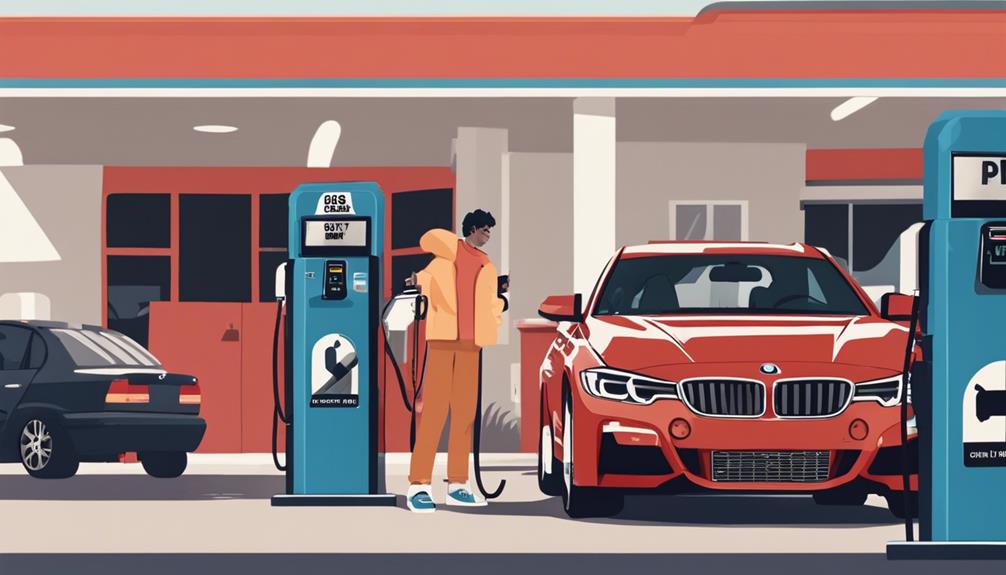
When fueling up your BMW 325i, remember that premium gas isn't just a necessity but a requirement for peak performance. Here are some essential points to keep in mind:
- Using premium gas with an octane rating of 91 or higher is essential to prevent engine knocking and maintain peak performance in your BMW 325i.
- Opting for regular gas may lead to reduced fuel efficiency and potential engine issues, ultimately costing you more in the long run.
- Premium gas plays a critical role in keeping your BMW 325i's engine clean and ensuring longevity by preventing premature wear.
While the upfront cost of premium gas may seem higher, the benefits it provides in terms of power, efficiency, and overall performance of your BMW 325i make it a worthwhile investment. So, next time you're at the pump, treat your car to the premium fuel it deserves for a smoother ride and a happier engine.
Reliability With Minimal Service Needs
Reliability shines through effortlessly in the BMW 3 Series, requiring minimal service to keep you cruising worry-free. With its low maintenance needs and durable build quality, the BMW 3 Series stands out as a beacon of longevity.
Owners revel in the fact that with proper care, this vehicle can easily reach 250,000 miles, a validation of its dependable nature. The minimal service requirements not only save you time but also contribute to increased satisfaction, proving that sometimes less is indeed more.
Imagine the joy of fewer visits to the mechanic and the peace of mind that comes with owning a car that's as reliable as it's stylish. The BMW 3 Series truly embodies the idea that a well-crafted machine can bring both joy and practicality to your driving experience.
Complexity of BMW Systems

Deciphering the intricate systems of a BMW can sometimes feel like trying to crack a complex code. From the sophisticated navigation software to the interconnected network of components, the sheer complexity of BMW systems can leave your head spinning.
But fear not, with the right knowledge and expertise, you can unravel the mysteries of your BMW and keep it running smoothly.
BMW System Intricacies
Traversing the intricate web of BMW systems can feel akin to deciphering a high-tech puzzle with costly pieces that require specialized handling and care. The BMW vehicles are equipped with complex systems that integrate sophisticated technology, blending mechanical and electronic components to deliver a luxurious driving experience. Understanding the system interplay is crucial for proper maintenance and effective troubleshooting. Due to the intricacies involved, diagnosis and repair of BMW systems demand a higher level of expertise, often leading to increased repair costs. Remember, moving through the maze of BMW systems requires a mix of patience, knowledge, and a touch of finesse.
- Complex Technology Integration
- Challenging Diagnosis and Repair
- Interplay of Mechanical and Electronic Components
Navigation Software Challenges
Amidst the maze of BMW systems lies a specific challenge that many owners face – maneuvering the intricate guidance software of the BMW 3 Series. The navigation software presents a series of challenges due to the complexity of BMW systems.
To guarantee peak performance, regular updates to the software are essential. Mastering the user interface and controls is key to effectively utilizing the navigation system. For those struggling to navigate through the software, seeking professional assistance or tutorials can be highly advantageous.
High Repair Expenses Due to Complexity
When dealing with the BMW 325i, brace yourself for potentially steep repair costs due to the intricate and specialized nature of its components and systems. Here's what you need to know:
- Specialized Tools: Repairing a BMW 325i often requires specialized tools and training, which can drive up the service costs.
- Advanced Technology: The advanced technology and engineering in BMW 325i vehicles can result in more intricate and costly repairs, making it essential to budget for maintenance.
- Diagnostic Equipment: Diagnostic equipment specific to BMW models may be necessary for accurate troubleshooting, adding to the overall repair expenses for the 325i.
Maintaining a BMW 325i can be a pricey affair, so be prepared for the sophisticated design and features to potentially dent your wallet. Remember, with great luxury comes great repair expenses!
Maintenance as a Significant Factor
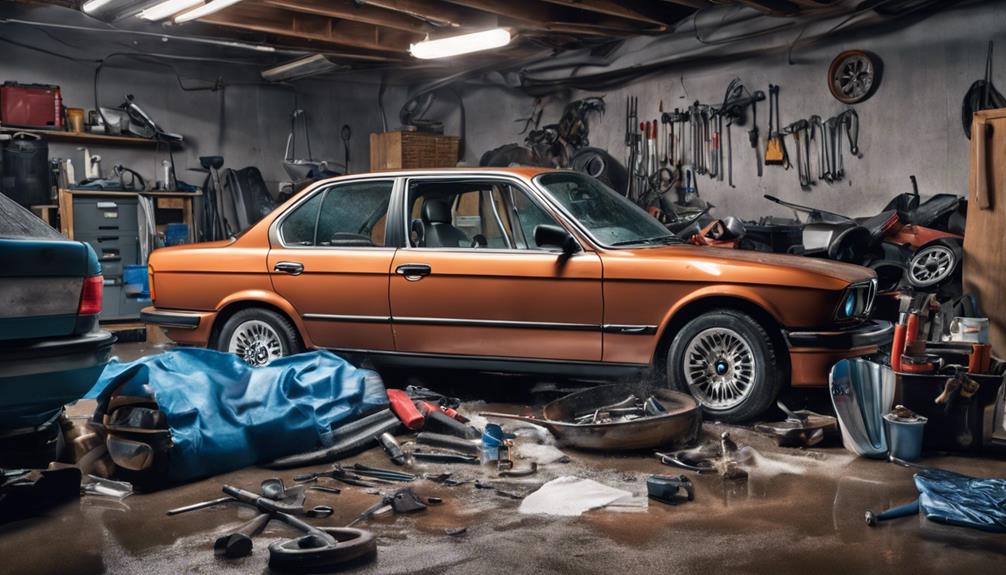
Exploring the intricate world of BMW 325i upkeep reveals the essential role it plays in reducing common issues and ensuring peak performance. Regular maintenance isn't just a task; it's your pass to a trouble-free driving experience. By following recommended schedules for fluid checks, tire inspection, and keeping an eye on battery terminals, you can prevent major issues from sneaking up on you. These seemingly routine tasks are the unsung heroes that can prolong your BMW 325i's life and keep it running in top form.
Don't underestimate the power of maintenance; it's like giving your car a spa day. Fluid checks are like hydrating your vehicle, tire inspections are the equivalent of a new pair of shoes, and clean battery terminals are the icing on the cake. Embrace these practices, and your BMW 325i will thank you by delivering peak performance and longevity. Remember, a little maintenance today can save you from a lot of headaches tomorrow.
Considerations for BMW 350i Owners
Considering the common issues faced by BMW 350i owners can help you prepare for potential maintenance challenges and guarantee a smooth driving experience. When owning a BMW 350i, you may encounter a few common mechanical issues that could affect your driving pleasure. Here are some key considerations for BMW 350i owners:
- Valve Cover Gasket: Be aware that oil leaks from the lower engine area are frequently reported by BMW 3 Series owners. Keep an eye out for any signs of oil leakage and consider a valve cover gasket replacement if needed.
- Blower Motor Resistor: The final stage fan resistor in BMW 3 Series cars is prone to failure, leading to issues with blower fan speeds. If you notice variations in fan speeds, it might be time for a blower motor resistor replacement.
- Repair Shop Visits: Plan for regular visits to the repair shop to address these common issues promptly, ensuring your BMW 350i stays in top condition for an enjoyable driving experience.
Frequently Asked Questions
What Is the Most Common Problems in Bmw's?
When owning a BMW, be wary of common issues like oil leaks, blower fan resistor failures, and mirror folding problems. Despite these quirks, your BMW's overall performance and luxury driving experience make it worth the occasional hassle.
How Many Miles Before BMW Has Problems?
Around 80,000 to 100,000 miles is when BMWs start facing problems. Oil leaks, electrical issues, and engine malfunctions can crop up. Stay on top of maintenance to prevent bigger headaches. Some models have sturdier parts.
What Are the Bad Years for BMW 3 Series?
If you're eyeing a BMW 3 Series, steer clear of the early model years like 2006 and 2007. Those babies are notorious for oil leaks, electrical gremlins, and engine woes. Be smart, dodge the headaches!
What Series Is BMW 350i?
If you're wondering about the BMW 350i, it's actually the BMW 325i in the 3 Series lineup. Known for performance, the 3 Series offers various engine choices and features for an enjoyable driving experience.






